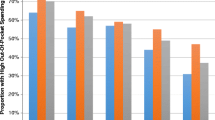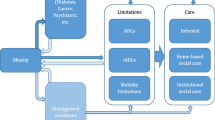Abstract
BACKGROUND: Uninsured adults in late middle age are more likely to have a health decline than individuals with private insurance.
OBJECTIVE: To determine how health and the risk of future adverse health outcomes changes after the uninsured gain Medicare.
DESIGN: Prospective cohort study.
PARTICIPANTS: Participants (N=3.419) in the Health and Retirement Study who transitioned from private insurance or being uninsured to having Medicare coverage at the 1996, 1998, 2000, or 2002 interview.
MEASUREMENTS: We analyzed risk-adjusted changes in self-reported overall health and physical functioning during the transition period to Medicare (t−2 to t0) and the following 2 years (t0 to t2).
RESULTS: Between the interview before age 65 (t−2) and the first interview after reaching age 65 (t0), previously uninsured individuals were more likely than those who had private insurance to have a major decline in overall health (adjusted relative risk [ARR] 1.46; 95% confidence interval [CI] 1.03 to 2.04) and to develop a new physical difficulty affecting mobility (ARR 1.24; 95% CI 0.96 to 1.56) or agility (ARR 1.33; 95% CI 1.12 to 1.54). Rates of improvement were similar between the 2 groups. During the next 2 years (t0 to t2), adjusted rates of declines in overall health and physical functioning were similar for individuals who were uninsured and those who had private insurance before gaining Medicare.
CONCLUSIONS: Gaining Medicare does not lead to immediate health benefits for individuals who were uninsured before age 65. However, after 2 or more years of continuous coverage, the uninsured no longer have a higher risk of adverse health outcomes.
Similar content being viewed by others
References
DeNavas-Walt C, Proctor BD, Mills RJ. Income, Poverty, and Health Insurance Coverage in the United States: 2003. Washington, DC: U.S. Census Bureau; 2004.
Hoffman C, Rice D, Sung HY. Persons with chronic conditions. Their prevalence and costs. JAMA. 1996;276:1473–9.
American Heart Association. Heart Disease and Stroke Statistics—2004 Update. Dallas, TX: American Heart Association; 2004.
Baker DW, Sudano JJ, Albert JM, et al. Lack of health insurance and decline in overall health in late middle age. N Engl J Med. 2001;345:1106–12.
Baker DW, Sudano JJ, Albert JM, et al. Loss of health insurance and the risk for a decline in self-reported health and physical functioning. Med Care. 2002;40:1126–31.
McWilliams JM, Zaslavsky AM, Meara E, et al. Health insurance coverage and mortality among the near-elderly. Health Aff (Millwood). 2004;23:223–33.
Hadley J, Waidmann T. Health insurance and health at age 65: implications for medical care spending on new Medicare beneficiaries. Health Serv Res. 2006;41:429–51.
McWilliams JM, Zaslavsky AM, Meara E, et al. Impact of Medicare coverage on basic clinical services for previously uninsured adults. JAMA. 2003;290:757–64.
An overview of health and retirement study components. Available at: http://hrsonline.isr.umich.edu/intro/sho_unifo.php?hfyle=overview&xtyp=2. Accessed March 10, 2005.
Mayfield D, McLeod G, Hall P. The CAGE questionnaire: validation of a new alcoholism screening instrument. Am J Psychiatry. 1974;131:1121–3.
Super N. Medigap: Prevalence, Premiums, and Opportunities for Reform. Washington, DC: National Health Policy Forum; 2002.
Heisler M, Langa KM, Eby EL, et al. The health effects of restricting prescription medication use because of cost. Med Care. 2004;42:626–34.
Fillenbaum GG, Burchett BM, Welsh KA. The 20-Item Word List Test as a Measure of Cognitive Functioning in the Health and Retirement Survey: Norms and Validity for White, African-American, and Hispanic Respondents, Health and Retirement Study Working Paper Series, 94-005; 1993. University of Michigan, Ann Arbor, MI.
Zhang J, Yu KF. What’s the relative risk? A method of correcting the odds ratio in cohort studies of common outcomes. JAMA. 1998;280:1690–1.
Ayanian JZ, Kohler BA, Abe T, et al. The relation between health insurance coverage and clinical outcomes among women with breast cancer. N Engl J Med. 1993;329:326–31.
Roetzheim RG, Gonzalez EC, Ferrante JM, et al. Effects of health insurance and race on breast carcinoma treatments and outcomes. Cancer. 2000;89:2202–13.
Roetzheim RG, Pal N, Gonzalez EC, et al. Effects of health insurance and race on colorectal cancer treatments and outcomes. Am J Public Health. 2000;90:1746–54.
Canto JG, Rogers WJ, French WJ, et al. Payer status and the utilization of hospital resources in acute myocardial infarction: a report from the National Registry of Myocardial Infarction 2. Arch Intern Med. 2000;160:817–23.
Sada MJ, French WJ, Carlisle DM, et al. Influence of payor on use of invasive cardiac procedures and patient outcome after myocardial infarction in the United States. Participants in the National Registry of Myocardial Infarction. J Am Coll Cardiol. 1998;31:1474–80.
Goldman DP, Bhattacharya J, McCaffrey DF, et al. Effect of insurance on mortality in an HIV-positive population in care. J Am Stat Assoc. 2004;96:883–94.
Lurie N, Ward NB, Shapiro MF, et al. Termination from Medi-Cal—does it affect health? N Engl J Med. 1984;311:480–4.
Lurie N, Ward NB, Shapiro MF, et al. Termination of Medi-Cal benefits. A follow-up study one year later. N Engl J Med. 1986;314:1266–8.
Franks P, Clancy CM, Gold MR. Health insurance and mortality: evidence from a national cohort. JAMA. 1993;270:737–41.
Sorlie PD, Johnson NJ, Backlund E, et al. Mortality in the uninsured compared with that in persons with public and private health insurance. Arch Intern Med. 1994;154:2409–16.
Jensen GA. Health insurance of the near elderly: a growing concern. Med Care. 1998;36:107–9.
Bindman AB, Haggstrom DA. Small steps or a giant leap for the uninsured? JAMA. 2003;290:816–8.
Sloan FA, Conover CJ. Life transitions and health insurance coverage of the near elderly. Med Care. 1998;36:110–25.
Short PF, Shea DG, Powell MP. Health insurance for Americans approaching age sixty-five: an analysis of options for incremental reform. J Health Polit Policy Law. 2003;28:41–76.
Miller W, Vigdor ER, Manning WG. Covering the uninsured: what is it worth? Health Aff (Milwood). 2004;W4:157–67.
Author information
Authors and Affiliations
Corresponding author
Additional information
An abstract describing these results was presented at the national meeting of the Society of General Internal Medicine on May 12, 2005.
The authors have no financial conflict of interest to declare for this article or this research.
This study was supported by grant number 2R01 HS10283 from the Agency for Healthcare Research and Quality (AHRQ).
Rights and permissions
About this article
Cite this article
Baker, D.W., Feinglass, J., Durazo-Arvizu, R. et al. Changes in health for the uninsured after reaching age-eligibility for medicare. J Gen Intern Med 21, 1144–1149 (2006). https://doi.org/10.1111/j.1525-1497.2006.00576.x
Received:
Revised:
Accepted:
Issue Date:
DOI: https://doi.org/10.1111/j.1525-1497.2006.00576.x




